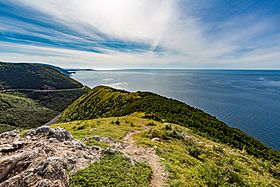Skyline Trail (Cape Breton Highlands National Park) facts for kids
Quick facts for kids Skyline Trail |
|
|---|---|

Skyline Trail, with French Mountain on the left, and the Gulf of St. Lawrence to the right
|
|
| Elevation | 455 m (1,493 ft) |
| Location | Cape Breton Highlands National Park |
| Range | Appalachian Mountains |
| Coordinates | 46°44′31″N 60°52′52″W / 46.741985°N 60.881000°W |
The Skyline Trail is a cool hiking path in Cape Breton Highlands National Park in Nova Scotia, Canada. It's about seven kilometers long and shaped like a loop. You'll find it on the west side of the Cabot Trail, close to the top of French Mountain. People love this trail for its amazing views! It's also known for an important event involving coyotes that led to new safety measures.
The trail is a loop, and about halfway through, you'll reach a boardwalk. The first part of the loop is very well kept and almost easy for wheelchairs. The second part is a simple hike over rocky ground and open fields. The boardwalk offers amazing views of the Cabot Trail and the ocean. There are also many signs along the trail that explain things about nature.
Contents
Animals You Might See
Hikers often spot moose and black bears on this trail. Near the coast, you might see Northern gannets flying. In the water offshore, many sea animals swim. These include minke whales, harbour seals, humpback whales, harp seals, fin whales, white-sided dolphins, sei whales, harbour porpoises, grey seals, and pilot whales.
Coyote Safety on the Trail
On October 27, 2009, an incident involving coyotes happened on this trail. A young Canadian singer named Taylor Mitchell was hiking alone. This event led to a lot of research and new safety rules for visitors. Park staff and wildlife experts worked together to understand coyote behavior.
New Safety Measures
After the incident, Parks Canada and other groups started a five-year research project. They wanted to learn more about why coyotes sometimes act boldly. Warning signs were put up at the start of all hiking trails. These signs teach visitors how to react if they see coyotes. Another incident happened on August 9, 2010, when a teenage girl was bitten by a coyote while camping. She received medical care to prevent rabies. These events helped the park create better safety guidelines for everyone.
Helping the Forest Grow Back
In 2015, Parks Canada started a project to help the park's boreal forest grow back. They built two large fenced areas on the trail. These fences help protect young trees from being eaten by moose. More than 57,000 trees have been planted inside and around these fenced areas. This helps the forest become healthy again.
 | Valerie Thomas |
 | Frederick McKinley Jones |
 | George Edward Alcorn Jr. |
 | Thomas Mensah |

